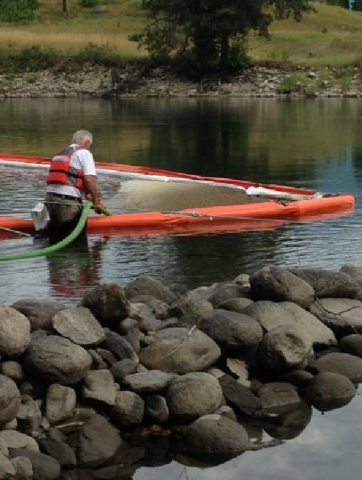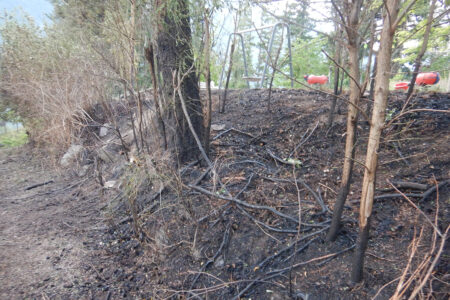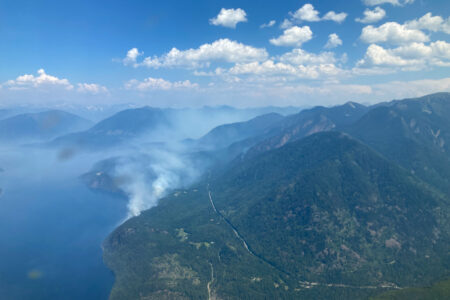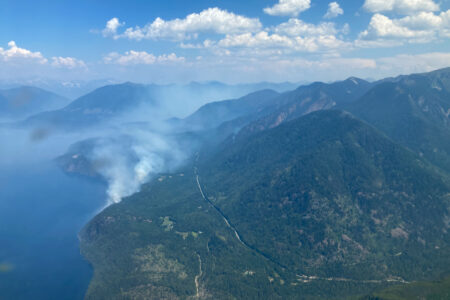UPDATE: Opinion on Slocan response - Resiliency Centre now to stay open to Aug. 23
Ed Note: The Source just got word that the Resiliency Centre will now be open until Aug. 23.
“We want to apologize to residents for any hardship that this incident may have caused,” says Wayne Smook, senior vice president, airport services for Executive Flight Centre, “and we want to assure that Executive Flight Centre is working hard to do everything we can to minimize the impact on people and the environment. We’re here until the job is done.”
This was in a July 29 press release after an EFC tanker spilled roughly 35,000 litres of aviation fuel into Lemon Creek on July 26 (see: https://castlegarsource.com/news/executive-flight-centre-issues-press-release-re-lemon-creek-spill-25779#.Ugv1Z20dLtQ )
Unfortunately, I think there are few Valley residents who feel EFC is coming even close to living up to the promise made here – in fact, terms like, “cut and run”, and “shirking responsibility”, are being thrown about fairly freely on Facebook and other social media outlets to which residents are flocking for information about how to manage contamination.
“ … everything we can to minimize the impact on people and the environment …”
I’m buying in, I think (bearing in mind my comparative ignorance of environmental sciences), to the latter argument being made here, as EFC continues to employ testing and remediation companies as well as clean-up crews (and I applaud their Castlegar job fair in which they made a point of hiring locals to help in the efforts).
But in terms of the impact on people … not so much. What I’ve seen is a minimal effort via the Resiliency Centre to placate people for the minimum amount of time necessary before they can get out of dodge and hand off the hard work to provincial and regional authorities as well as local not-for-profit agencies.
Former volunteer coordinator John Wittmayer (his short-term contract was not renewed by EFC contractor Quantam Murray) said it’s his personal opinion that EFC wants to close the Resiliency Centre specifically because it opens a communication conduit between the company and impacted residents – a conduit he thinks EFC simply no longer wishes to fund. (The centre was originally slated for closure today, Aug. 14, but is now set to shut down on Friday).
“I believe they are shirking all responsibility in terms of food issues, water issues, relocation issues,” Wittmayer said, calling EFC updates and releases “propaganda”.
In a press release Aug. 12, EFC indicated, “To assist in the transition from Community Resiliency to Community Recovery, the Regional District of Central Kootenay has appointed a Recovery Manager. Nelle Maxey, a Winlaw resident, will begin in the role this week and more information will be shared as it is available.”
What they didn’t extrapolate on is that Maxey’s contract ends Aug. 23, with many residents still reeling from the economic, physical and emotional impact of this disaster.
I’ve seen ample anecdotal evidence of residents who will suffer greatly should the potable water supply be removed by EFC, and of people needing immediate help who simply aren’t getting it. There could (and should be) a book written on the subject, but I don’t have room for a book here, so I’m going to capsulize it down to one issue: when I asked EFC information officer Jonathan Lok why there wasn’t a fund set up immediately for community crisis management, he said that’s part of why Maxey was hired, to address that sort of “short-term emergency need”.
1. She was hired by RDCK, not EFC – why are the taxpayers footing the bill, instead of EFC?
2. Short term? This was more than two weeks after the fact! Talk about too little, too late.
3. My job is to parse official information and make it comprehensible for the average Joe. It’s what I do for a living. Even I couldn’t parse the response I got in terms of who is accountable for what and who should go where for what concerns – what I got was a complicated, almost incomprehensible response involving, “inter-agency response” and collaborative mandate that would confuse a Harvard graduate, much less a Slocan farmer suffering from fume inhalation.
4. “We’re here until it’s done,” sounds pretty hollow as the Resiliency Centre prepares to close on Friday.
So here’s my question: Why was there not immediately a fund – say, $200,000 (a drop in the bucket compared to the legal costs EFC is now flirting with in terms of lawsuits) to address immediate needs like farmers who can’t eat their own food (many Slocan residents are now struggling with that issue), sick people who need to be relocated, people who need medical transportation due to spill-related symptoms, and so on? It’s a no-brainer, and the very first thing I would’ve done after the immediate jeopardy of explosion and evacuation had been handled.
Secondly, I would’ve set up a fund to assist already-strained local service agencies to cope with the dramatically increased burden they face as a direct result of the spill – how about providing traffic control for the public meeting they held in Winlaw, instead of leaving the onus on an already-exhausted (and themselves-impacted) volunteer fire department? (And just look at the fallout from that oversight). Where’s the donation to the Slocan food bank, which already faces resource issues that will now almost-surely be exacerbated thanks to the spill? Where is the money for community services societies to provide counselling for residents coping with trauma in the face of helplessness and loss? Even just providing a paid-for childcare facility for residents undertaking the laborious process of disposing of contaminated crops, flushing wells, and trying to find food while lugging water from miles away for basic needs like cooking, drinking and bathing.
For that matter, where’s the transparency in sharing testing and sampling results for local eco-societies to create baselines for ongoing remediation?
I’ll accept that they’re trying to clean up the river – but claiming to care about the impact on people seems, to me, to be an outrageous dishonesty given their lack of action as far as these same people are concerned.
Yes, they have a 1-800 line where you can leave a message (and by all accounts, Lok has been diligent and conscientious about responding to same), but that’s a far cry from, “ … everything we can to minimize the impact on people …”.
They say talk is cheap – but I’m not sure that will be the case here. I know if I was a judge hearing a class action lawsuit, I would consider things like whether a simple reporter like myself could, in five minutes, think of a half-dozen things EFC could have done to mitigate impact, but did not. I think they may, ultimately, find their talk was very expensive indeed, largely because it wasn’t followed up with adequate meaningful action.
There seem to be dozens of numbers to call, and no real help on offer.
I’ve seen little indication that the many ministries involved are going to stand up for local residents and force EFC to address the real human impacts of this spill.
These people, about whom EFC claims to care, don’t just need help three weeks – or three months – down the road when all the investigations are complete and all the agencies and ministries involved have achieved a consensus about who takes responsibility for what and what that will look like.
They need help NOW.
Lok said, “There is no intent to abandon people, but people’s perception of (what that looks like) is a moving goalpost.”
I hope EFC moves those goalposts closer to the people who are in the thick of the game.
I have, all along, wanted to believe their promises – and I don’t think I’m alone in that.
But they’re not making it very easy.






















